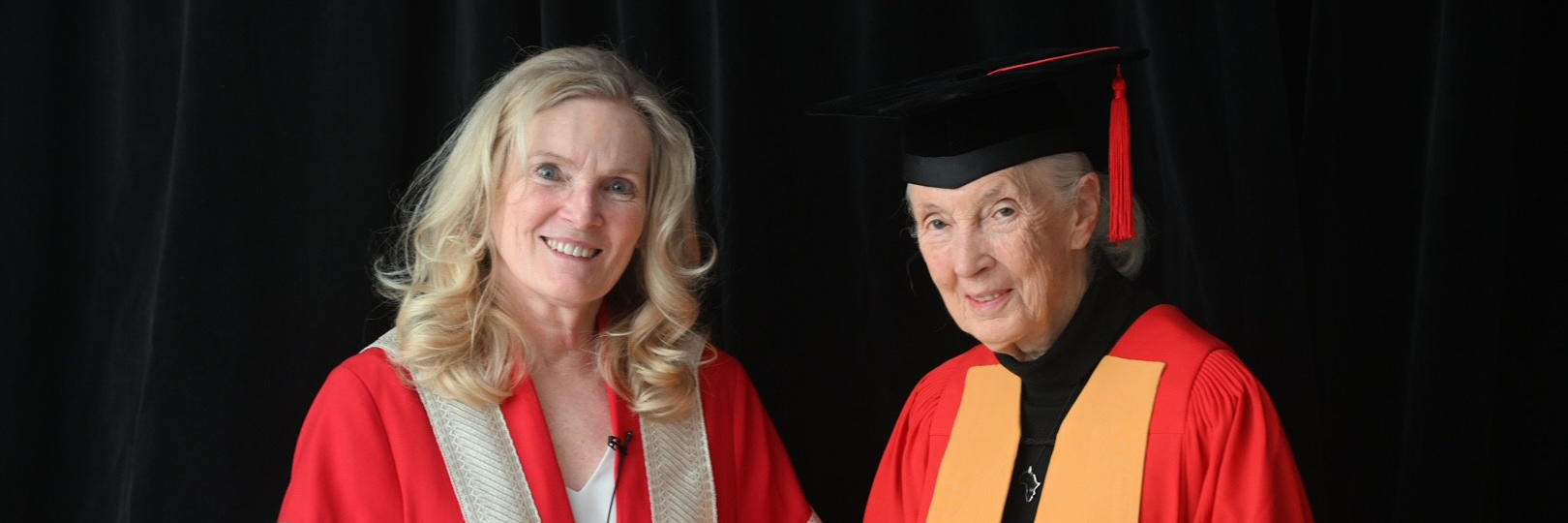
The following is President and Vice-Chancellor Rhonda Lenton’s address at the Honorary Degree Convocation Ceremony in April 2024:
Dear faculty, staff, guests and to our students in the audience today, bonjour and boozhoo.
I am delighted to welcome all of you to this special celebration in honour of our exceptional honorary degree recipient, Dr. Jane Goodall.
Science paints a bleak picture of our future.
Failure to respond to the damaging effects of climate change is already evident in the loss of biodiversity, environmental degradation, increased risk to water and food security, intensifying suffering and loss of life of humans and animals, not to mention magnifying political conflicts and social inequality around the world.
The One Health approach acknowledges that humans, animals and the environment are interconnected, and that in order to advance one, we must fight for the health of all three.
We are at an inflection point: will we take individual and collective action and work together to identify and develop solutions that will ensure our planetary well-being? Or will we be complacent or even deny the evidence affecting us all?
Looking toward the people we have on stage and in the audience, we know that we have the talent, the diversity of ideas and the commitment to shape the actions that need to be taken.
Like many of you, I have long been inspired by Dr. Goodall’s legacy.
Throughout her life, Jane Goodall has conducted groundbreaking research, advanced conservation and environmental stewardship, and inspired advocacy for our planet and all its inhabitants.
Jane, it is an absolute honour to have you here with us today to recognize the remarkable impact you have made across the world. I know I speak on behalf of all of York when I say that your achievements are an inspiration to us all.
Thank you for all that you have done and continue to do, and congratulations on this very well-deserved recognition.
At York University, we recognize the importance of convening people and ideas for meaningful action.
Since its inception, York has been a progressive, research-intensive University committed to enhancing the well-being of the communities we serve by supporting research excellence, interdisciplinary knowledge translation and collaborative partnerships that drive positive change, both locally and globally.
Advancing sustainability is a goal that underscores everything we do, which is why our University Academic Plan includes an institutional challenge to strengthen our contributions to the United Nations’ Sustainable Development Goals (UN SDGs).
Our impact is well noted – we have been recognized as a global leader for five consecutive years in the Times Higher Education Impact Rankings, where we currently rank in the world’s top 40 for our impact on the SDGs.
Each of the Faculties represented here today – Science, Health and the Lassonde School of Engineering – have played a critical role in elevating our sustainability leadership with cutting-edge initiatives such as:
- the UNITAR Global Water Academy – a joint initiative led by York in collaboration with UNITAR and various other partners to address the global water crisis, which is led by inaugural director Professor Sapna Sharma from the Faculty of Science;
- Connected Minds – a groundbreaking, collaborative, $318.4-million research initiative led by York in partnership with Queen’s that is creating an international hub of expertise in socially responsible research and technology;
- numerous projects by Lassonde that promote green energy solutions and a reduction in greenhouse gases – including a dynamic project undertaken in partnership with Stronach International to develop and test a new generation of affordable, electric micro-mobility vehicles.
At the institutional level, we have announced ambitious goals to achieve net zero by 2040 or sooner. And we are well positioned to meet these aspirations through our various decarbonization initiatives.
For example, through a recent partnership with Noventa Energy Partners, the York community will leverage leading technology to convert wastewater into thermal energy, an initiative that could see Glendon become the first net-zero campus in Canada.
We continue to move the dial on education, research and partnerships across our campuses – from Toronto to Costa Rica to India – to support the SDGs, but each and every one of us must do more to support global co-operation that translates ideas, research and partnerships into positive change. There is, perhaps, nothing more important than this endeavour. For people like Dr. Goodall, it has become a hallmark of her life’s work – and it is incumbent upon us to carry this forward.
As our talented faculty, staff, contract instructors, alumni, students, and honorary doctorates have proven time and time again, individual actions matter, and by fostering dialogue and collective action, we can build a brighter, more sustainable future for all.
Jane, congratulations once again, and I look forward to hearing more from you shortly.
Thank you all once again for joining us today and for being part of this very special occasion.
Merci. Miigwetch.
